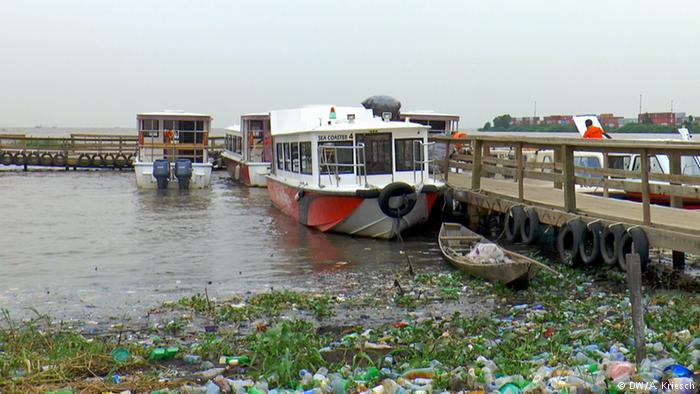The Nigerian Maritime Administration and Safety Agency (NIMASA) on Thursday, February 20, 2020 said that a considerable number of coastal communities in the country have no official waste collection service.

Director-General of NIMASA, Dr Dakuku Peterside, made this known at an Awareness Programme for Marine Litter and Public Presentation of the Maritime Action Plan on Marine Litter and Plastic Management.
According to him, this lack of waste collection service means that there is nowhere for litter to go and regrettably, most of the waste generated in these communities end up in the seas and oceans.
He noted that the overall implication for the Nigerian economy were enormous, as the presence of marine litter and plastics in our waters was impacting negatively on the drive to make Nigeria a greener, safer and healthier nation.
“The issue of marine litter and plastics in the seas and oceans has remained a global concern, particularly, following the increased awareness about blue economy and its derivable benefits.
“The challenges of marine litter and plastic pollution are multiple and include threat to food security, economic activities, navigational hazard, water safety, ecosystem and harmful to marine life and bio-diversity among others.
“It is a known fact that our oceans and seas sustain lives but when the threats to ocean health are numerous, it also affects human beings,” he said.
Peterside said that a report by the World Economic Forum projected that, by the year 2050, plastics in the oceans would outweigh fish if not mitigated.
He added that the International Solid Waste Association (ISWA) in a study said that 83 per cent of the 4.8 to 12.7 million tonnes of land-based plastic waste that ended up in the ocean from the 192 coastal countries originated from 20 countries including Nigeria.
He pointed out that these occurrences were not only evident globally or continentally but also in Nigeria, which was among top 20 nations that contributed 83 per cent of total volume of land-based plastic waste that ended up in the oceans and seas.
The director-general said that a recent report in September 2019 by the Voice of America (VOA), also showed that Nigeria generated an estimated 32 million tonnes of solid waste per year, one of the highest in Africa.
He said that of that figure, plastic constituted 2.5 million tonnes, which posed a great danger to the environment and particularly our marine ecosystem.
“Solutions to this global challenge are multiple and require consideration of a systematic approach to the various sources generating the pollution, both land-and sea-based contributors and a combination of intervention in different sectors and at different levels,” he said.
Peterside said that the approach had led to the formation of a Marine Litter Action Plan with the purpose of setting a national roadmap to tackle all issues, especially the ones arising from shipping related activities.
He said that others were to identify specific actions that needed to be taken by different parties to reduce and eliminate marine litter and plastics from our seas and oceans, strengthen corporation and collaborations in tackling marine litter and plastic pollution.
He noted that others were to establish a template that would monitor progress in the fight against marine litter and plastics in our seas and oceans, build, operationalise and compliment International Maritime Organisation’s (IMO) action plan on marine litter from ships.
According to him, others are to enhance the enforcement of existing laws, conventions and regulations and to increase the awareness and understanding of the dangers of marine litter and the need for joint efforts to tackle it.
Peterside said that he expected that the Marine Litter Action Plan would trigger the needed behavioural change in the country, improve development and enable the enforcement of new initiatives to tackle marine litter and plastics.
He said that NIMASA had taken several actions in the campaign against marine litter and plastics such as engaging of Marine Litter Marshals across coastal communities and littoral areas as a pilot scheme.
Others are pilot clean-up of identified marine litter hotspots in coastal states of Bayelsa, Cross River, Akwa Ibom, Rivers, Delta, Ondo and Lagos as well as marine litter sensitisation campaign in 500 littoral communities and others.
Sen. Tolu Odebiyi, a representative of Senate Committee on Marine Environment, said that the Senate was putting up a draft bill to prohibit the proliferation of plastics and by-product that were harmful to the environment.
According to him, the bill will be focused on manufacturers to ensure that they are responsible with their businesses.
“NIMASA alone cannot drive this move, it should be a collective effort and there is need to create awareness for everybody to understand the extent of the litter we have on our waterways and drainages.
“Our concern is the front end which has to do with manufacturers. They need to create a recycling plant for their waste products as Federal Government is spending millions of naira to clean up this menace,” he said.
By Chiazo Ogbolu
